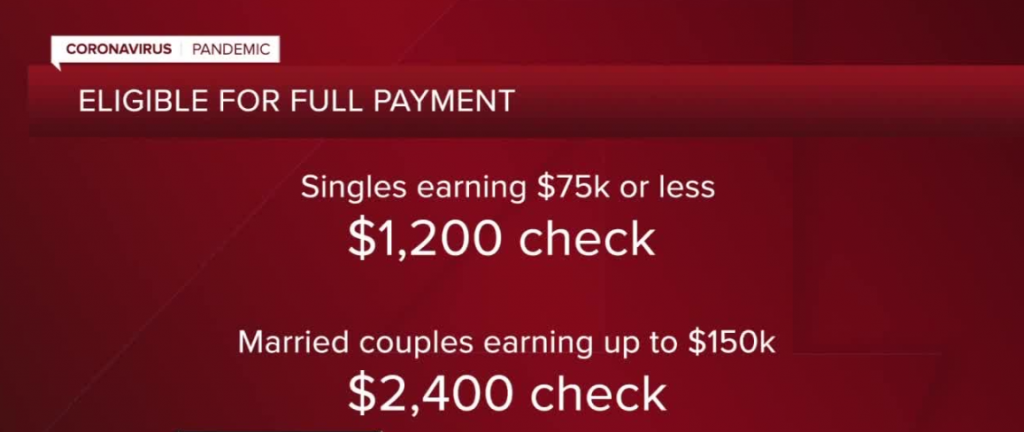Twelve years ago, during the last financial meltdown this country endured, stimulus checks were sent to us. They came in two waves, the first one larger than the second. It was a simple matter of a check in the mail. Now, the House passed a $2.2 trillion coronavirus stimulus relief bill, and President Trump’s signature made it law. That means virtually every American is entitled to get money from the federal government. That is good news for everyone, and life-saving news for some. However, the method of delivery is different this time, and everyone must know how it is going to be different. If you slip through a crack, it may be harder to get your stimulus check. It will be delayed…at least.
First off, how much of a check can I expect?
The standard Covid-19 relief payment is$1,200, but the exact amount you will receive could vary. You will get more if dependent children live with you, but less if your Adjusted Gross Income (line seven on your tax return) exceeds $75,000.

This is your stimulus . We help you know how to get your stimulus check.
Gotcha. That’s simple enough math, but you said delivery could be tricky.
Yes, receiving the payment could be a little involved for some people. Unfortunately, people in the greatest need could have trouble collecting. The feds aren’t sending people into the neighborhood looking for little ole’ you.
What, exactly, do I have to do?
If you filed taxes for 2018 or 2019, and received a refund via direct deposit, you are golden. Step to the front. Since the IRS handles the checks, they will turn to the fastest way, and the way with which they are most familiar. They will direct deposit your check in your checking account. Expect yours within the month.
I am up-to-date on my taxes, but I took my refund through the mail.
It will take a little longer to get your stimulus check. Paper checks will take 1-2 months to arrive.
What if, theoretically, I had not filed my taxes for over two years?
Temple University Professor Steve Balsam runs the University’s Tax Assistance Program. He had this to say:
“The IRS will contact people who didn’t file because they didn’t have enough income. They will merge records with the Social Security Administration and mail a check to your last known address.”
What if you don’t have an accurate address on file with the Social Security Administration? I mean, they aren’t high on my change of address list when I move.
Here is where things get tricky. People who are homeless, have been couch-surfing, or who are off the grid, will likely have to get proactive.
“A lot of these volunteer (tax help) sites, if they’re not physically open, they do have somebody manning a phone line, things like that – you can call up, you can send an email, you can get some advice, maybe some help in actually preparing that return,” Balsam said. “If you don’t have to prepare a return or if you’re homeless, you can probably find some social service agency to help you apply for that check – because again, you’re homeless but you have a social security number, you’re entitled to the check.”
“Know what you’re entitled to and ask for help,” he added.
Is there anything else you think I should know?
Yes, one more thing. If you fall into the group of people who have changed banks since you received your refund, listen up. The IRS will send a letter within 15 days after they are ready to go. In that letter will be instructions for what to do if the banking information they have is incorrect. Read this information carefully, so you don’t end up trusting a bank you spurned to forward a check of this size to you. They “probably” will, but don’t open yourself up to the possibility that it isn’t their first priority.
Gildshire hopes this guide will help you get your stimulus check without delay or difficulty. Good luck with the reason for the stimulus in the first place. We’re all in this together.




